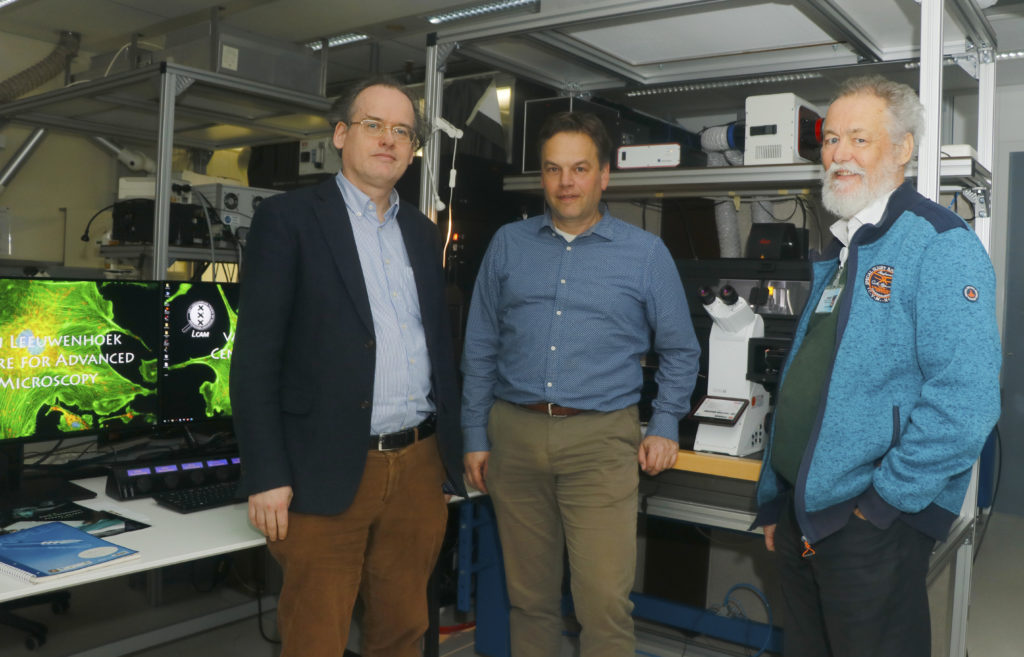NWO Roadmap NL-BioImaging: A Dutch infrastructure of advanced microscopy
Advanced microscopy to understand life and fight disease.
NL-BI is the Dutch infrastructure network for advanced light microscopy in life sciences integrated in the ESFRI program Euro-BioImaging and closely linked to the Dutch Society for Microscopy (NVvM). Participants are all Dutch universities, UMCs, as well as thematic research institutes. .
NL-BI will develop and connect
state-of-the-art technologies and services for functional imaging of live
processes to investigate phenotypic heterogeneity, responses, and mechanisms. A
dedicated national FAIR data-management and analysis team will link all Dutch
microscopy facilities, and enable greater reuse, mining, and interlinking of
large amounts of image data generated using novel AI tools. High-content and
functional imaging will create the necessary fundaments to integrate microscopy
with the omics technologies (‘visual omics’), requiring on-the-fly data
analysis and smart microscopy. By connecting these components, NL-BI will
enable fundamental insights and innovative applications, such as development of
biomarkers, vaccines, and personalized medicine for complex disorders as
cardiovascular disease, cancer, diabetes, and neurodegenerative disorders.
Key aims of national relevance are to further develop advanced microscopy, create the necessary infrastructure, and provide expertise to enable the Dutch research community to:
- Use new molecular probes and biosensors for functional imaging
- Apply fast 3D imaging technologies for functional imaging in complex live-cell systems
- Carry out high-content microscopy screens for cell phenotype changes
- Bridge scales towards electron microscopy and intravital microscopy
- Automate complex microscopy workflows and on-the-fly data analysis to massively increase experimental throughput and provide unbiased, researcher-independent output
- Use a national network for FAIR image data management providing infrastructure, training, and easy-to-use workflows for data analysis of biological images by state-of-the-art neural networks
- Establish a nation-wide training and outreach platform for scientists at all levels
By providing coordinated access to the Netherlands’ best imaging technology and analysis platforms, the NL-BI roadmap proposal will achieve much-needed excellence in advanced optical microscopy to secure the international competitiveness of Dutch life science research.

LCAM: New state-of-the-art equipment
With the financing of the NL-BioImaging Roadmap, all participating Dutch microscopy centres can bring their infrastructure to the top level, specific techniques and expertise are connected, and a national network for data analysis and management will be set up. This opens the door to new scientific breakthroughs by thousands of life scientists in the Netherlands. In LCAM Amsterdam, for example, 4 million will be invested in equipment and 1.5 million in support, which gives an enormous boost to state-of-the-art microscopy cell biology. At the University of Amsterdam, under supervision of Dorus Gadella (LCAM-UvA and Swammerdam Institute for Life Sciences), investments will be made in a new super-resolution microscope, which produces 3-5 times sharper images than conventional microscopes by making smart use of shortening of the (nanosecond 10-9 s) fluorescence lifetime. Gadella: ‘We were able to test this concept with new switchable fluorescent proteins and biosensors developed by ourselves, so we know this technique will actually work in living cells and yield dynamic super-resolution information.’
Consortium leader Eric Reits (LCAM – Amsterdam UMC) will install a high-content 3D microscope with which fast processes with fluorescent biosensors in organoid models can be analysed on-the-fly. Reits: ‘Using self-steering microscopy scripts, the microscope is fast enough to quantify the effects of potential therapeutic strategies and to isolate cells with an interesting phenotype for proteome, metabolome and genome analysis, i.e. visual omics.’ Kees Jalink (LCAM-NKI) invests in the development of automated pooled microscopy screening, in which extensive compounds and CRISPR knockout libraries are tested in cells for changes in phenotype. Jalink: ‘By using different fluorescent biosensors that we develop at LCAM, researchers can screen which compounds and genes effectively change a phenotype in cells.’
Education
All these developments put LCAM and Amsterdam further on the map. Since Gadella and Reits coordinate the unique biomedical Master’s track Cell Biology and Advanced Microscopy, in collaboration with Jalink, the new technologies and analysis scripts will also be used immediately in education, thus training the new generation of cell biologists. Reits: ‘Within this master’s program, students learn hands-on how to make optimal use of the various microscopes and they learn about the possibilities of AI data analysis. Combined with internships at (inter)national microscopy expertise groups, they are well prepared to immediately implement these state-of-the-art techniques in biomedical research as PhD students.’
LCAM
News
- NWO Roadmap NL-BioImaging: A Dutch infrastructure of advanced microscopy
- LCAM centre among best in Europe
- LCAM Advanced Microscopy Course
- LCAM Website restyled

 Posted by MarkHink in
Posted by MarkHink in 